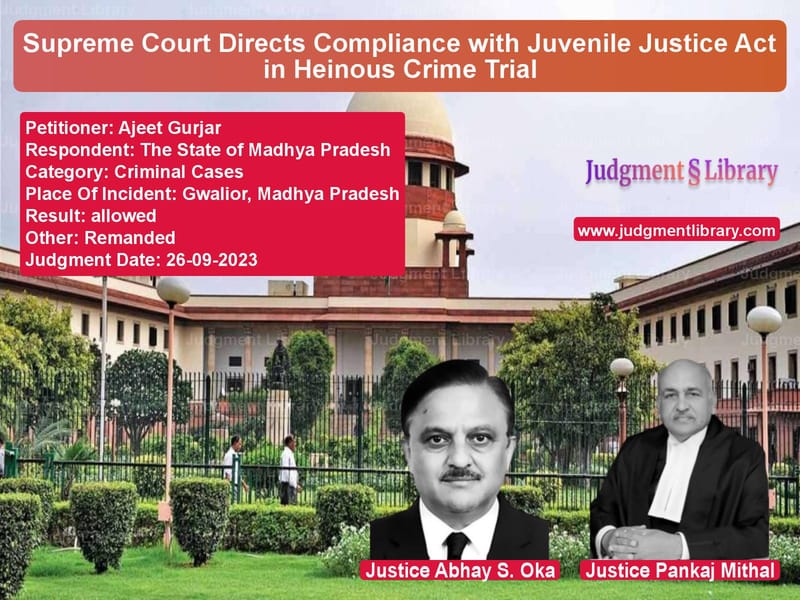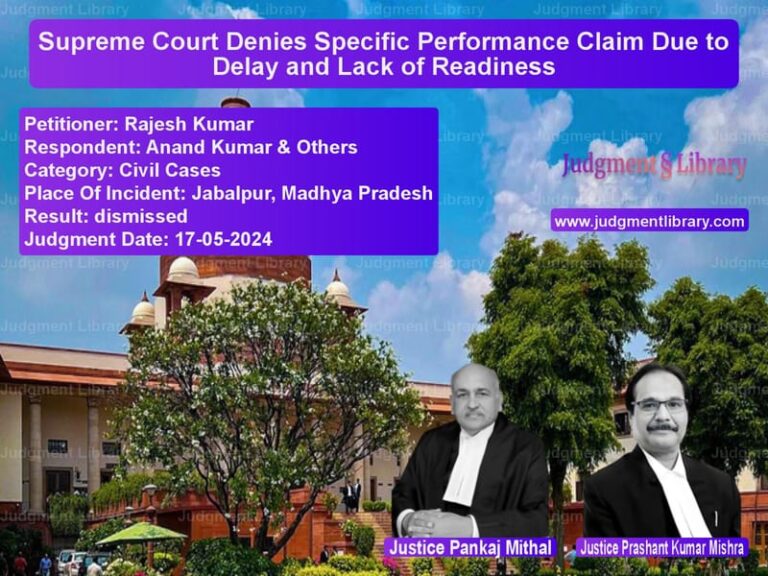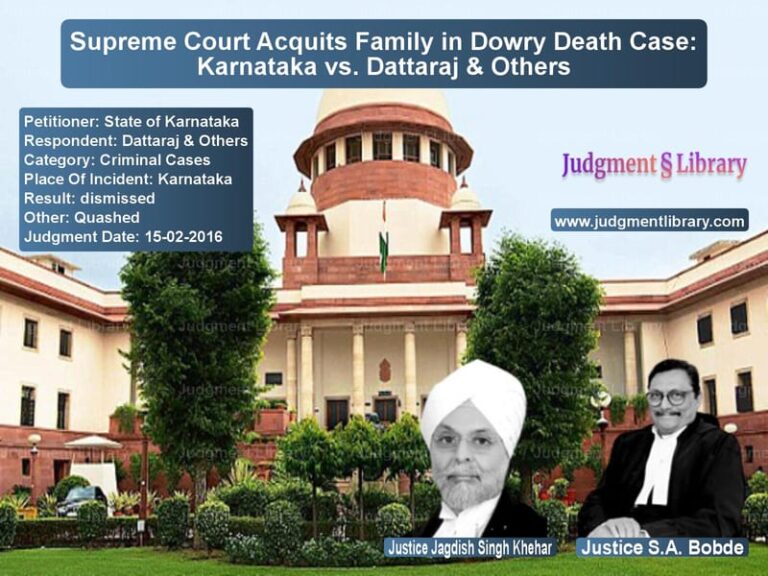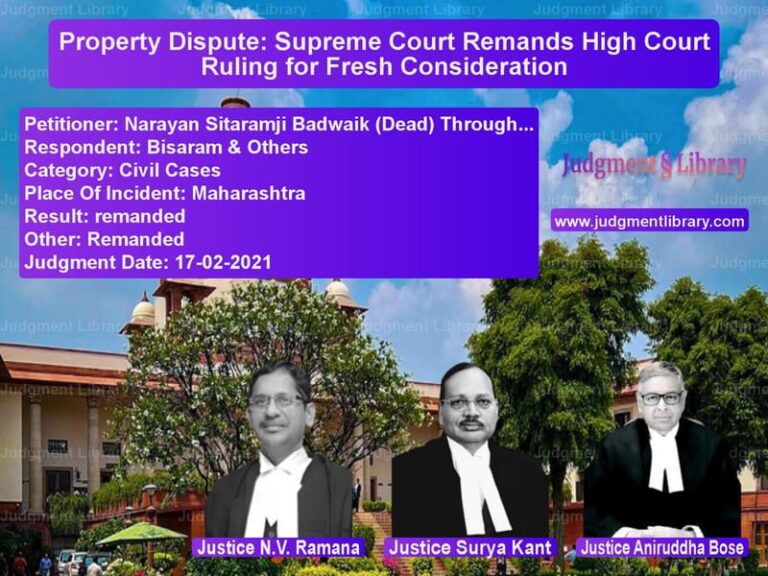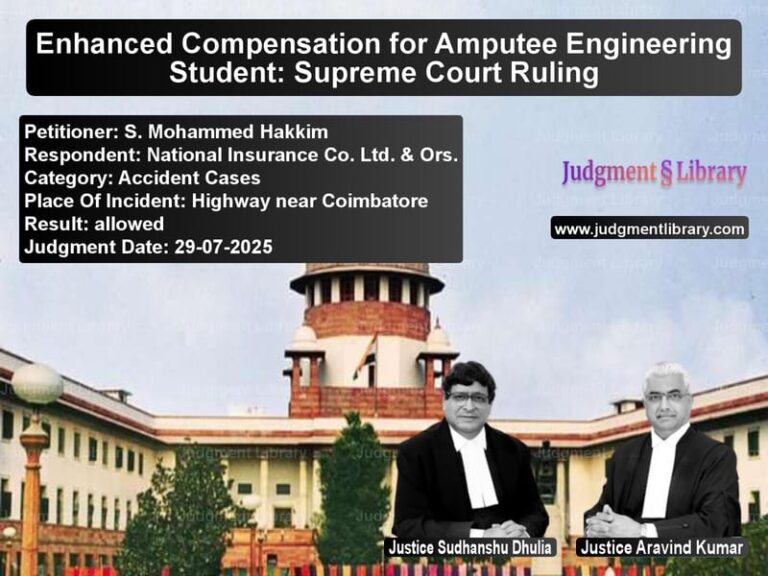Supreme Court Directs Compliance with Juvenile Justice Act in Heinous Crime Trial
The Supreme Court in Ajeet Gurjar vs. The State of Madhya Pradesh addressed an important issue regarding the trial of juveniles involved in heinous offenses under the Juvenile Justice (Care and Protection of Children) Act, 2015 (JJ Act). The case involved a juvenile accused in a murder and dacoity case, where the Children’s Court failed to follow the statutory procedure under Section 19 of the JJ Act. The Supreme Court set aside previous orders and directed compliance with the JJ Act.
Background of the Case
The case originates from an FIR registered against multiple accused, including Ajeet Gurjar, for offenses punishable under:
- Sections 302, 307, 147, 148, and 149 of the IPC (Murder and Attempt to Murder)
- Sections 395 and 397 of the IPC (Dacoity with attempt to cause death or grievous hurt)
- Sections 11/13 of the Madhya Pradesh Dakaiti Aur Vyapharan Prabhavit Kshetra Adhiniyam, 1981 (MPDVPK Act)
- Sections 25 and 27 of the Arms Act, 1959 (Illegal possession and use of arms)
The charge sheet was filed on September 12, 2016. Since the accused was a juvenile at the time of the offense, the Juvenile Justice Board (JJB) conducted a preliminary assessment under Section 15 of the JJ Act. Based on the findings, the Board transferred the case to the Children’s Court under Section 18(3) of the JJ Act.
Legal Issues Raised
The Supreme Court had to decide:
- Whether the Children’s Court followed the mandatory procedure under Section 19(1) of the JJ Act.
- Whether the trial court erred in rejecting the accused’s application seeking compliance with Sections 6 and 15 of the JJ Act.
- Whether the accused should be tried as a juvenile or as an adult.
Petitioner’s Arguments (Ajeet Gurjar)
The petitioner contended:
- The Children’s Court did not conduct an inquiry under Section 19(1) of the JJ Act before proceeding with the trial.
- As per the JJ Act, the Children’s Court was required to assess whether the juvenile should be tried as an adult or treated under juvenile provisions.
- The failure to conduct this inquiry violated the petitioner’s right under the Juvenile Justice (Care and Protection of Children) Model Rules, 2016 (JJ Model Rules).
- The trial court and the High Court wrongly assumed that once the case was transferred from the JJB, no further inquiry was needed.
Respondent’s Arguments (State of Madhya Pradesh)
The State countered:
- The accused had been involved in multiple serious offenses, justifying his trial as an adult.
- The JJB had already conducted a preliminary assessment before transferring the case, fulfilling the legal requirements.
- The Children’s Court was competent to proceed with the trial without another inquiry.
- The High Court had correctly observed that the accused was 24 years old at the time of the proceedings and was no longer entitled to juvenile protections.
Supreme Court’s Ruling
The Supreme Court examined the procedural aspects and ruled in favor of the petitioner, directing the Children’s Court to comply with Section 19(1) of the JJ Act.
1. Inquiry Under Section 19(1) is Mandatory
- The Court emphasized that once a case is transferred under Section 18(3), the Children’s Court must independently decide whether to try the accused as a juvenile or an adult.
- Section 19(1) provides that the Children’s Court can either:
- Try the child as an adult as per the Criminal Procedure Code (CrPC).
- Conduct an inquiry as a Board and pass appropriate orders under Section 18 of the JJ Act.
- The Court held that the use of “may” in Section 19(1) should be read as “shall,” making the inquiry mandatory.
2. Preliminary Assessment is Not a Substitute for Inquiry
- The JJB’s preliminary assessment under Section 15 is only the first step.
- The Children’s Court must conduct its own inquiry before making a final determination on trial as an adult.
- The High Court’s assumption that the order under Section 18(3) was final was incorrect.
3. Importance of Fair Trial and Special Considerations for Juveniles
- The Court emphasized that juveniles should receive a fair trial in a child-friendly atmosphere.
- Section 19 requires courts to consider:
- The child’s mental and physical capacity to commit the offense.
- The ability to understand the consequences of the offense.
- The circumstances in which the offense was committed.
- The failure to conduct this assessment deprived the petitioner of protections under the JJ Act.
Final Judgment
The Supreme Court:
- Set aside the orders of the High Court and Trial Court.
- Directed the Children’s Court to conduct an inquiry under Section 19(1).
- Ordered the Sessions Judge in Gwalior to examine if the POCSO Special Court could hear the case.
- Directed the expeditious completion of the inquiry.
Impact of the Judgment
This ruling has far-reaching implications:
- Ensuring due process: The judgment reinforces the necessity of separate procedures for juvenile offenders.
- Clarifying the role of Children’s Courts: The ruling sets a precedent for courts to independently assess juvenile cases.
- Balancing justice and rehabilitation: The decision ensures that juveniles receive a fair assessment while maintaining public safety concerns.
Conclusion
The Supreme Court’s decision in Ajeet Gurjar vs. State of Madhya Pradesh reaffirms the importance of procedural safeguards in juvenile justice cases. By directing compliance with Section 19(1) of the JJ Act, the Court ensures that juveniles are given the opportunity for rehabilitation or fair trial, as the law prescribes. The ruling will serve as a guiding precedent in cases involving children in conflict with the law, reinforcing the judiciary’s commitment to protecting juvenile rights.
Petitioner Name: Ajeet Gurjar.Respondent Name: The State of Madhya Pradesh.Judgment By: Justice Abhay S. Oka, Justice Pankaj Mithal.Place Of Incident: Gwalior, Madhya Pradesh.Judgment Date: 26-09-2023.
Don’t miss out on the full details! Download the complete judgment in PDF format below and gain valuable insights instantly!
Download Judgment: ajeet-gurjar-vs-the-state-of-madhya-supreme-court-of-india-judgment-dated-26-09-2023.pdf
Directly Download Judgment: Directly download this Judgment
See all petitions in Juvenile Justice
See all petitions in Bail and Anticipatory Bail
See all petitions in Custodial Deaths and Police Misconduct
See all petitions in Judgment by Abhay S. Oka
See all petitions in Judgment by Pankaj Mithal
See all petitions in allowed
See all petitions in Remanded
See all petitions in supreme court of India judgments September 2023
See all petitions in 2023 judgments
See all posts in Criminal Cases Category
See all allowed petitions in Criminal Cases Category
See all Dismissed petitions in Criminal Cases Category
See all partially allowed petitions in Criminal Cases Category

